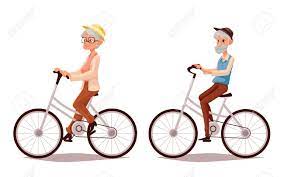The pandemic has provided an opportunity for younger people to reimagine their everyday travel trips. Many now work from home instead of taking travel trips into the office. If they need to ride in a vehicle, they travel at off-peak times and avoid congestion. Significantly, sales of bikes and e-bikes have surged as younger people seek alternative ways to get places and get exercise.
Older age groups- Boomers and their elders- have adjusted to the pandemic with different transportation habits. For the most part they have stayed indoors and reduced travel altogether. In urban centers they shun public transportation- travel on subways, buses, or ferries. Although the numbers have yet to be tabulated, Boomers have left the car sitting in the garage because of reduced work roles and fewer social visits. Early on in the lockdown, they exorcised leisure trips and tourism that began on airplanes, coaches, or guided tours.
Travel Recovery
There have been predictions that recreational travel and tourism will rebound, perhaps by 2022. The first round of “travel recovery” will take place nationally as all age groups resume family reunions, multi-generational meet-ups, and family vacations.
But, what about day- to- day trip taking? Note that before Covid, most age groups were showing a downward trend in the number of vehicle trips and daily VMT (vehicle miles travelled). The singular exception was miles traveled and person-trips data for people 65 and older, which was increasing.
The pandemic may have reversed these generational differences. To the extent that younger people have moved further away from dense cities, and into more suburban or rural areas, they add VMT as they grow more car dependent. That said, we do not know whether the real numbers of younger people moving out are inflated to tell a new story. In a year or two, will there still be a sustained, long-term movement away from cities?
Counting Cars…
That will be a vital data point. People outside of cities rely on cars more because transit is limited and distances are further. During Covid, the sales of new automobiles actually dropped by about 15%, but that may not be the long-term trend.
Electric vehicles, both cars and bikes, could be the post-Covid beneficiary. If the numbers verify that young people have left the cities, an environmental ethos may follow. EVs may be the choice that ‘satisfies’ between taking public transit versus owning a personal vehicle. Meanwhile, whether in cities or suburbs, younger people will rally to advance the bike lanes and safer pedestrian paths that were hastily carved out by public works during the pandemic .
Post Covid, the Boomers may also reinvent their travel habits. They are likely to question the value of international travel, particularly on cruise ships and organized tours. For some time to come, they will associate those modes with the initial spread of the virus. As an alternative, Boomers may return to the American pastime of motoring. Some will venture into motor home vacations but that is highly sensitive with gas prices.
Less Miles, More Connection
One of the key telecomm/transport lessons emerging from the Covid is not about the miles. It is how important it is to be tele-connected. Boomers were able to stay in touch with each other, and even help mind the grandkids with Zoom. Many learned, for the first time, to download books from the library and movies from Amazon or Netflix. Others scheduled tele-visits with doctors. And, ironically, when it came to getting a Covid vaccine, those with the best technology skills were likely to be the first in line.
With telecommunications now established even Boomers may reduce their trend to drive more, at least for day- to-day shopping and errands. Even before the pandemic, they were probably on the verge of cutting despite the 2017 NHTS results. Now, four years later, the people who choose to age in place eventually need to cut back their driving routines. The oft-quoted and (dated) quote is that older people will outlive their ability to drive safely by seven to ten years.
Healthy Changes Ahead?
One of the best trends coming out of Covid may be the convergence of new habits. Older people might learn from younger people about the benefits of driving less and using micro-mobility more. In Northern Europe, older people have a tradition of riding bicycles into their seventies and eighties. And, if older people here use their cars to go to stores less, perhaps they will visit recreational centers out -of -doors more often. These are healthy changes.
Meanwhile, both younger people and older people may come out of the pandemic with more recognition that travel and wellness are not independent. Younger people might imagine a work week with fewer exasperating hours spent idling in rush hour traffic and more time on an e-bike or going outdoors for a stroll. For older people, the future may also be about bikes and walking, less travel in the car, and a lot more time getting things done on the computer or smartphone.
